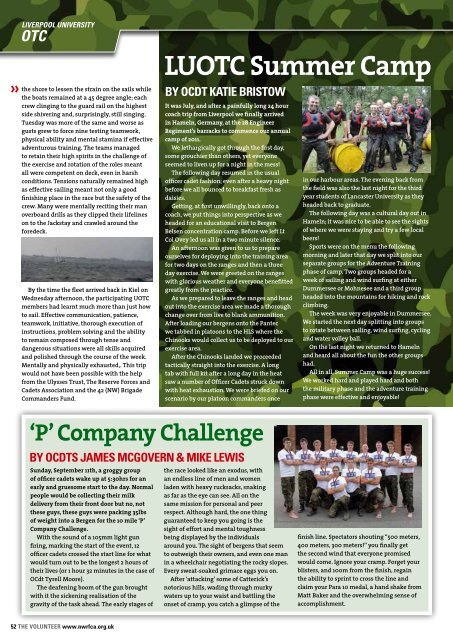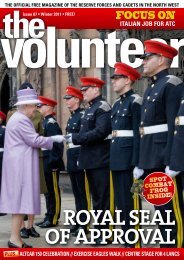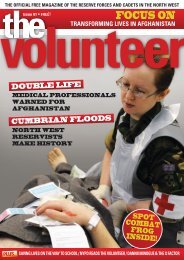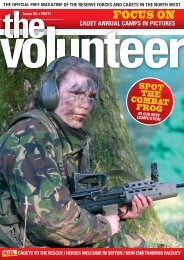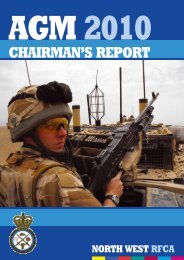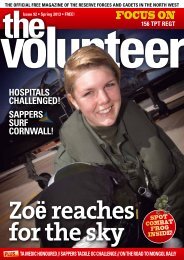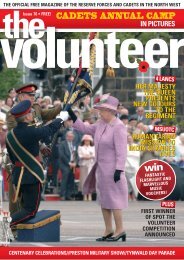Issue 87 - NWRFCA - Northwest Reserve Forces & Cadets Association
Issue 87 - NWRFCA - Northwest Reserve Forces & Cadets Association
Issue 87 - NWRFCA - Northwest Reserve Forces & Cadets Association
Create successful ePaper yourself
Turn your PDF publications into a flip-book with our unique Google optimized e-Paper software.
Liverpool University<br />
OTC<br />
»<br />
the shore to lessen the strain on the sails while<br />
the boats remained at a 45 degree angle; each<br />
crew clinging to the guard rail on the highest<br />
side shivering and, surprisingly, still singing.<br />
Tuesday was more of the same and worse as<br />
gusts grew to force nine testing teamwork,<br />
physical ability and mental stamina if effective<br />
adventurous training. The teams managed<br />
to retain their high spirits in the challenge of<br />
the exercise and rotation of the roles meant<br />
all were competent on deck, even in harsh<br />
conditions. Tensions naturally remained high<br />
as effective sailing meant not only a good<br />
finishing place in the race but the safety of the<br />
crew. Many were mentally reciting their man<br />
overboard drills as they clipped their lifelines<br />
on to the Jackstay and crawled around the<br />
foredeck.<br />
By the time the fleet arrived back in Kiel on<br />
Wednesday afternoon, the participating UOTC<br />
members had learnt much more than just how<br />
to sail. Effective communication, patience,<br />
teamwork, initiative, thorough execution of<br />
instructions, problem solving and the ability<br />
to remain composed through tense and<br />
dangerous situations were all skills acquired<br />
and polished through the course of the week.<br />
Mentally and physically exhausted,. This trip<br />
would not have been possible with the help<br />
from the Ulysses Trust, The <strong>Reserve</strong> <strong>Forces</strong> and<br />
<strong>Cadets</strong> <strong>Association</strong> and the 42 (NW) Brigade<br />
Commanders Fund.<br />
LUOTC Summer Camp<br />
by OCdt Katie Bristow<br />
It was July, and after a painfully long 24 hour<br />
coach trip from Liverpool we finally arrived<br />
in Hameln, Germany, at the 28 Engineer<br />
Regiment’s barracks to commence our annual<br />
camp of 2011.<br />
We lethargically got through the first day,<br />
some grouchier than others, yet everyone<br />
seemed to liven up for a night in the mess!<br />
The following day resumed in the usual<br />
officer cadet fashion; even after a heavy night<br />
before we all bounced to breakfast fresh as<br />
daisies.<br />
Getting, at first unwillingly, back onto a<br />
coach, we put things into perspective as we<br />
headed for an educational visit to Bergen<br />
Belsen concentration camp. Before we left Lt<br />
Col Ovey led us all in a two minute silence.<br />
An afternoon was given to us to prepare<br />
ourselves for deploying into the training area<br />
for two days on the ranges and then a three<br />
day exercise. We were greeted on the ranges<br />
with glorious weather and everyone benefitted<br />
greatly from the practice.<br />
As we prepared to leave the ranges and head<br />
out into the exercise area we made a thorough<br />
change over from live to blank ammunition.<br />
After loading our bergens onto the Pantec<br />
we tabbed in platoons to the HLS where the<br />
Chinooks would collect us to be deployed to our<br />
exercise area.<br />
After the Chinooks landed we proceeded<br />
tactically straight into the exercise. A long<br />
tab with full kit after a long day in the heat<br />
saw a number of Officer <strong>Cadets</strong> struck down<br />
with heat exhaustion. We were briefed on our<br />
scenario by our platoon commanders once<br />
in our harbour areas. The evening back from<br />
the field was also the last night for the third<br />
year students of Lancaster University as they<br />
headed back to graduate.<br />
The following day was a cultural day out in<br />
Hameln; it was nice to be able to see the sights<br />
of where we were staying and try a few local<br />
beers!<br />
Sports were on the menu the following<br />
morning and later that day we split into our<br />
separate groups for the Adventure Training<br />
phase of camp. Two groups headed for a<br />
week of sailing and wind surfing at either<br />
Dummersee or Mohnesee and a third group<br />
headed into the mountains for hiking and rock<br />
climbing.<br />
The week was very enjoyable in Dummersee.<br />
We started the next day splitting into groups<br />
to rotate between sailing, wind surfing, cycling<br />
and water volley ball.<br />
On the last night we returned to Hameln<br />
and heard all about the fun the other groups<br />
had.<br />
All in all, Summer Camp was a huge success!<br />
We worked hard and played hard and both<br />
the military phase and the adventure training<br />
phase were effective and enjoyable!<br />
‘P’ Company Challenge<br />
By OCdts james McGovern & mike Lewis<br />
Sunday, September 11th, a groggy group<br />
of officer cadets wake up at 5:30hrs for an<br />
early and gruesome start to the day. Normal<br />
people would be collecting their milk<br />
delivery from their front door but no, not<br />
these guys, these guys were packing 35lbs<br />
of weight into a Bergen for the 10 mile ‘P’<br />
Company Challenge.<br />
With the sound of a 105mm light gun<br />
firing, marking the start of the event, 12<br />
officer cadets crossed the start line for what<br />
would turn out to be the longest 2 hours of<br />
their lives (or 1 hour 32 minutes in the case of<br />
OCdt Tyrell Moore).<br />
The deafening boom of the gun brought<br />
with it the sickening realisation of the<br />
gravity of the task ahead. The early stages of<br />
the race looked like an exodus, with<br />
an endless line of men and women<br />
laden with heavy rucksacks, snaking<br />
as far as the eye can see. All on the<br />
same mission for personal and peer<br />
respect. Although hard, the one thing<br />
guaranteed to keep you going is the<br />
sight of effort and mental toughness<br />
being displayed by the individuals<br />
around you. The sight of bergens that seem<br />
to outweigh their owners, and even one man<br />
in a wheelchair negotiating the rocky slopes.<br />
Every sweat-soaked grimace eggs you on.<br />
After ‘attacking’ some of Catterick’s<br />
notorious hills, wading through murky<br />
waters up to your waist and battling the<br />
onset of cramp, you catch a glimpse of the<br />
finish line. Spectators shouting “500 meters,<br />
400 meters, 300 meters!” you finally get<br />
the second wind that everyone promised<br />
would come. Ignore your cramp. Forget your<br />
blisters, and 100m from the finish, regain<br />
the ability to sprint to cross the line and<br />
claim your Para 10 medal, a hand shake from<br />
Matt Baker and the overwhelming sense of<br />
accomplishment.<br />
52 the volunteer www.nwrfca.org.uk


